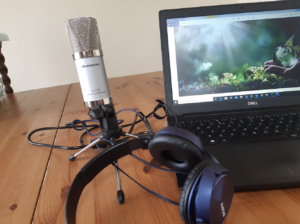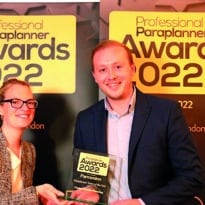Rebecca Kowalski, compliance manager and paraplanner at Cornerstone Asset Management, describes how she came to be passionate about responsible investing and helped develop the firm’s RI proposition
I’ve worked in financial services for over 30 years. This has included a bit of admin, a little advising, more recently compliance and in between, a very long time as a paraplanner.
Of those 30 years of service, 2020 proved to be an unexpected highlight for me It was the year in which my career became a vocation – when the personal and the professional came together and everything fell into place. While my official role at Cornerstone Asset Management is that of compliance manager, with a side order of oversight of Paraplanning, the icing on the cake is my ever increasing involvement in and influence over the development of the company’s Responsible Investment proposition.
My specialist subject
There are several reasons why I have a passion for Responsible Investing, which I prefer as a more inclusive term than the more widely-used ESG (Environmental, Social and Governance). On a personal level, the United Nations Sustainable Development Goals which often underpin this style of investing align with my long-standing personal belief in a fairer distribution of economic wealth that has lingered since my student days travelling in developing countries. Around four years ago, I was woken up to environmental issues and the climate crisis, with the call to action coming not from David Attenborough, Greta Thunberg or ‘The Day After Tomorrow’ but from my daughter, who is now a graduate working in environmental science, a vegan, an activist, an inspiration who wants the world saved before she ever considers having children of her own.
On a professional level, I raised the idea of developing a Responsible Investment proposition in 2016, after reading articles about the rise of the millennials. I was working as a paraplanner at that point and also a member of Cornerstone’s Investment Committee. I have always found intergenerational planning one of the more interesting aspects of financial planning, as well as a key issue for a sustainable advisory business. I liked the idea of incorporating a Responsible Investment solution with planning for children and grandchildren, offering clients potential to invest for a more protected natural environment and fairer society, as well as a financial stepping stone. Of course, at that stage it was just a high level concept, I had never heard of ESG, stranded assets, transition risk or supply chain emissions!
Gaining Momentum
For a small company with its existing client needs always centre-stage, it took a while for our responsible investmentproposition – Responsible Futures – to become the key business initiative that it is in 2021. We launched it as a proactive, rather than a reactive, investment solution in 2019. At that time, after months of research and due diligence, we felt confident that we had a market leading, impactful, thoroughly risk-managed suite of portfolios. We felt it was time for us, rather than a small number of our clients, to start the conversation about climate change, about risks to nature and the benefits of investing in companies that metaphorically fight fires rather than causing them.
We also felt that it was important to offer more than just a set of thematic investment portfolios but to fully integrate responsible investing into the business and I volunteered to work on client communications and all-staff training prior to a public launch event. I also found myself getting invited into client meetings to share with them my passion for the themes, funds, companies and UN goals that they had the opportunity to invest in.
Time for another exam
While enthusiasm and some reading can get you so far, I have always preferred to have some real substance to the knowledge I can share. With Fellowship under my belt, I thought my studying days were over but I put my hand up to study for the CFA Certificate in ESG Investing. The course has helped me gain a better understanding of the history and framework of responsible investment, the risks it seeks to address and the way in which environmental, social and corporate governance considerations are embedded into portfolio management. I sat and passed the test on 6 January 2021.
Content-wise, I found the course pretty interesting, although one or two chapters are perhaps more relevant to a fund or portfolio manager than an adviser. I learnt a lot more about the S and the G in ESG and revision helped me nail what seemed an impossible task at outset – remembering all the many acronyms for the key organisations. Finally, I know what PRI, SASB, TCFD, UNEP FI, UNFCC and UK SIF stand for!
The value of knowledge
Continuing with acronyms, I have always found that becoming an SME (subject matter expert) is a great way of building confidence and winning respect. A decent employer (if you don’t have one of those, then make that your S in ESG priority) will rely on you and value you if you know more about a key subject than they do. Make sure it’s a subject that benefits clients and/ or brings revenue to the business. Working for various small to medium sized firms during my paraplanning career, I have at times become an expert in asset allocation and stochastic modeling, trust and IHT planning, cash flow modeling, RDR, auto enrolment, FCA defined benefit pension rules and SMCR. Having acquired knowledge by reading or watching everything I could lay my hands on, I sought to put that knowledge into practice by integrating it into advice processes and/or re-writing business policy.
 When it came to responsible investing, what better way to put my new knowledge to the test than using lockdown to launch a podcast on the subject. Researching questions for expert guests actually became as important a means of learning as my exam studies!
When it came to responsible investing, what better way to put my new knowledge to the test than using lockdown to launch a podcast on the subject. Researching questions for expert guests actually became as important a means of learning as my exam studies!
As a paraplanner, as busy as it may get, you do tend to have more time/ inclination to learn than a busy adviser/business owner. The more that researching and writing suitability reports becomes second nature, the more I would advocate keeping your work rewarding, both mentally and financially, by looking to add a valuable specialism.
A journey just beginning
I am extremely excited about continuing to build expertise in Responsible Investing. It’s a challenge I am embracing not just because of my personal interest in the subject and its importance to the business, but also because it’s such an ever-evolving field. Academics, scientists, governments, industry leaders and investment experts are all working to develop and refine innovative technologies and practices, new methods of measuring and reporting, groundbreaking solutions to momentous, urgent problems. All with the world watching and the clock ticking.
Unlike subjects such as Defined Benefit pensions or cash flow modeling, responsible investing and its underlying themes are a subject everyone is interested in just now, from Prince to Prime Minister, from mothers to movie directors. The noise is only going to increase with the UN COP 26 on Climate Change coming to Glasgow in November, a stone’s throw from the office I’m actually beginning to miss. Also, with the optimistic view that we will either beat this virus or learn to live with it, climate change will be the crisis that remains after the pandemic has passed.
I am well aware that my little Certificate in ESG Investing can only make me a relative expert in this field, within my own small pond, and I’m currently looking into further study. There are many people who have degrees and PHDs, years of debating and discussing among fellow experts, communication with the public and consultation at company and government level. I have been tracking them all over social media and every webinar and workshop I can find a way into through the long months working from home. They will probably always know more than me. However, I’m more than ready to be a small fish in a big sea and do what I can to communicate the importance of harnessing finance to the cause of climate change and to the wider United Nations Sustainable Development Goals.
Playing our part for the planet
I do feel that my contribution has value – as a relative newcomer to the subject of investing for people and planet, I can look to help and encourage others who wish to find out more, without seeming too much of an ivory tower academic. I can combine my fresh knowledge of sustainability in all its forms with my more mature familiarity of personal financial planning and risk management – using this to ensure that clients who invest responsibly look out for themselves, as well as society and the environment. With the analytical eye developed as a paraplanner, I can seek out authentic and impactful solutions and reject greenwashing and the bandwagons.
I listened recently to the popular Outrage and Optimism podcast, hosted by Christiana Figueres, former executive secretary of the United Nations Framework Convention on Climate Change (UNFCC). She talked about connecting the personal, the local and the global in the fight against climate change. It struck me that my interest in responsible investing does just that – I have connected a personal passion for this subject to professional activity set locally, in the heart of Scottish COP 26 territory, as well as within the confines of my particular industry. However, the ultimate aim for this meeting of the personal and professional is to have a global impact. Our clients are investing their funds, under our care and guidance, into companies that will help deliver food, shelter, energy, education, medicine, connectivity and clean water to people all across the planet, whilst avoiding businesses that cannot or will not change negative behaviours.
If that’s not a reason to be excited about being in my fourth decade in financial services, I don’t know what is!
This article was first published in the March 2021 issue of Professional Paraplanner





























